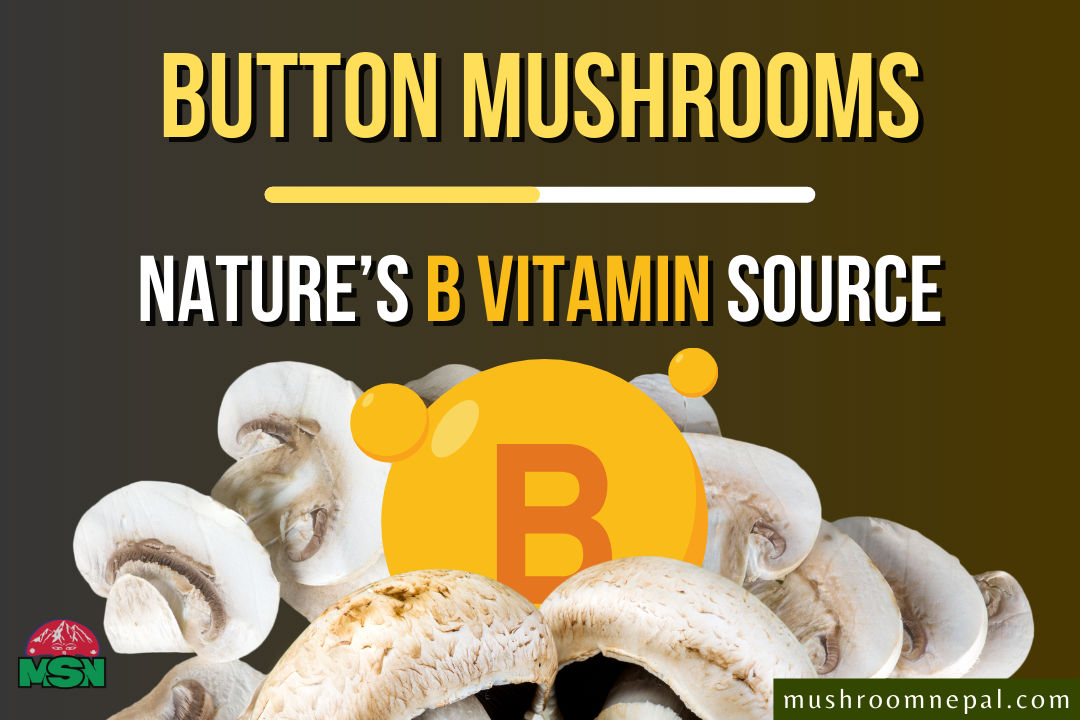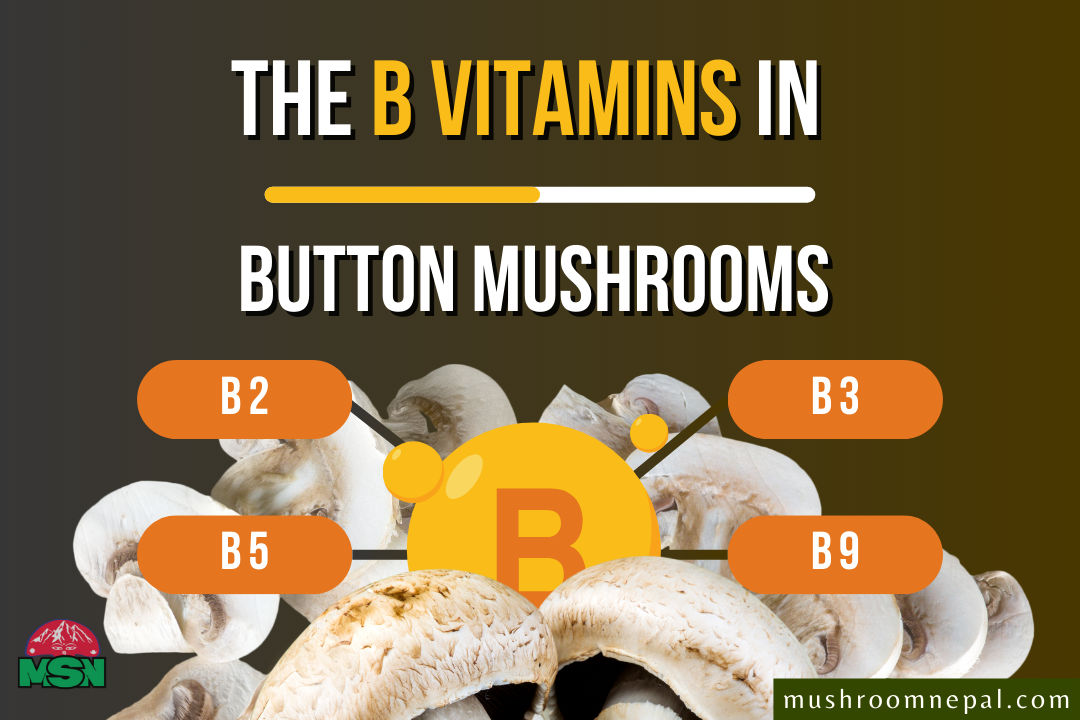Button Mushrooms: Nature’s B Vitamin Source
•
5 min read
Share:

Button mushrooms, sometimes referred to as Agaricus bisporus or white mushrooms, are a common sight in kitchens all over the world. These tiny, multipurpose fungi do more than just enhance food flavor. They are abundant in B vitamins, which are vital nutrients that promote brain function, energy production, and general well-being. B vitamins are found in nature, and button mushrooms are a simple way to improve your health, whether you eat them raw in salads, sauté them in a stir-fry, or blend them into soups. The advantages of button mushrooms, the particular B vitamins they offer, and easy ways to incorporate them into your diet—all supported by trustworthy nutritional data—will be covered in this blog.  Button mushrooms contain several key B vitamins, each contributing to your health. Below is a breakdown based on nutritional data from the USDA :
Button mushrooms contain several key B vitamins, each contributing to your health. Below is a breakdown based on nutritional data from the USDA :  Button mushrooms are versatile and easy to incorporate into meals. Here are some practical ideas:
Button mushrooms are versatile and easy to incorporate into meals. Here are some practical ideas:
What Are B Vitamins and Why Do They Matter?
A class of water-soluble nutrients known as B vitamins is essential to your body's everyday operations. They support brain function, aid in the production of red blood cells, and aid in the conversion of food into energy. The majority of B vitamins must be regularly consumed through food because your body cannot store them . Button mushrooms are perfect for a variety of diets because they are a convenient plant-based source of these essential nutrients.The B Vitamins in Button Mushrooms
 Button mushrooms contain several key B vitamins, each contributing to your health. Below is a breakdown based on nutritional data from the USDA :
Button mushrooms contain several key B vitamins, each contributing to your health. Below is a breakdown based on nutritional data from the USDA : - Riboflavin (Vitamin B2): Supports energy metabolism by breaking down carbohydrates, proteins, and fats. It also promotes healthy skin and vision. One cup (70g) of raw button mushrooms provides approximately 0.28 mg of riboflavin, about 22% of the daily recommended intake for adults .
- Niacin (Vitamin B3): Aids digestion, skin health, and nerve function. One cup of cooked button mushrooms (156g) contains around 5.6 mg of niacin, roughly 35% of the daily needs for adults .
- Pantothenic Acid (Vitamin B5): Essential for energy production and red blood cell formation. A cup of raw button mushrooms offers about 1.04 mg, contributing roughly 21% of the daily recommended intake .
- Folate (Vitamin B9): Crucial for DNA synthesis and cell division, especially during pregnancy. One cup of raw button mushrooms provides approximately 11.9 µg of folate, a modest but valuable contribution to the 400 µg daily requirement .
Health Benefits of Button Mushrooms as a B Vitamin Source
The B vitamins in button mushrooms offer several science-backed health benefits:- Boosted Energy Levels: Riboflavin and niacin help convert food into energy, reducing fatigue and keeping you active .
- Improved Brain Health: Niacin and pantothenic acid support cognitive function, potentially enhancing focus and mental clarity .
- Healthy Skin and Vision: Riboflavin promotes skin repair and maintains eye health, reducing the risk of vision-related issues .
- Support for Vegetarians and Vegans: B vitamins are often found in animal products, so button mushrooms are a valuable plant-based source for meat-free diets .
How to Add Button Mushrooms to Your Diet
 Button mushrooms are versatile and easy to incorporate into meals. Here are some practical ideas:
Button mushrooms are versatile and easy to incorporate into meals. Here are some practical ideas: - Side Dish: Cook sliced mushrooms with garlic and olive oil for a quick, nutrient-packed side.
- Salad Topper: Add raw, thinly sliced mushrooms to salads for a fresh, crunchy texture.
- Soup or Stew Booster: Toss mushrooms into soups or stews for added flavor and nutrition.
- Stir-Fry Star: Include mushrooms in stir-fries with vegetables and lean protein for a balanced meal.
- Stuffed Mushrooms: Fill button mushrooms with herbs, cheese, or breadcrumbs for a healthy appetizer.
Why Choose Button Mushrooms?
Button mushrooms stand out as nature’s B vitamin source for several reasons:- Affordable and Accessible: Available year-round in grocery stores, they’re budget-friendly and widely available.
- Low in Calories: One cup of raw button mushrooms contains only about 15 calories, making them ideal for weight-conscious diets .
- Versatile Flavor: Their mild, earthy taste complements a variety of dishes, from savory to spicy.
- Nutrient-Dense: Beyond B vitamins, they provide fiber, selenium, and potassium, supporting overall health .
Are Button Mushrooms Right for Everyone?
Button mushrooms are safe for most people when purchased from reputable sources. However, individuals with mushroom allergies should avoid them. Wild mushrooms should be identified carefully, as some varieties are toxic . Stick to store-bought button mushrooms for safety and convenience.Conclusion
Button mushrooms are more than a culinary staple—they’re a nutrient powerhouse delivering essential B vitamins for energy, brain health, and wellness. Whether you’re seeking a natural energy boost or a plant-based nutrient source, these humble mushrooms are an excellent addition to any diet. Start incorporating button mushrooms into your meals today to enjoy their flavor and health benefits. Have a favorite mushroom recipe? Share it in the comments below, and let’s inspire each other to make the most of nature’s B vitamin source!References
- National Institutes of Health. (2023). Vitamin B2 (Riboflavin) Fact Sheet for Health Professionals. https://ods.od.nih.gov/factsheets/Riboflavin-HealthProfessional/
- U.S. Department of Agriculture. (2023). FoodData Central: Mushrooms, white, raw. https://fdc.nal.usda.gov/fdc-app.html#/food-details/169251/nutrients
- National Institutes of Health. (2023). Dietary Reference Intakes for Vitamins. https://ods.od.nih.gov/HealthInformation/nutrientrecommendations.aspx
- Kennedy, D. O. (2016). B Vitamins and Cognitive Function. Nutrients, 8(11), 68. https://doi.org/10.3390/nu8110068
- Huskisson, E., et al. (2007). The Role of Vitamins in Energy Metabolism. Journal of International Medical Research, 35(3), 277-289. https://doi.org/10.1177/147323000703500301
- Craig, W. J. (2010). Nutrition Concerns and Health Effects of Vegetarian Diets. Nutrition in Clinical Practice, 25(6), 613-620. https://doi.org/10.1177/0884533610385707
- Kalaras, M. D., et al. (2017). Mushrooms: A Source of Ergothioneine. Food Chemistry, 233, 429-433. https://doi.org/10.1016/j.foodchem.2017.04.109
- Slavin, J. L., & Lloyd, B. (2012). Health Benefits of Fruits and Vegetables. Advances in Nutrition, 3(4), 506-516. https://doi.org/10.3945/an.112.002154
- Beug, M. W. (2017). Mushroom Poisoning in North America. North American Mycological Association. https://www.namyco.org/mushroom_poisoning.php
Share this article: